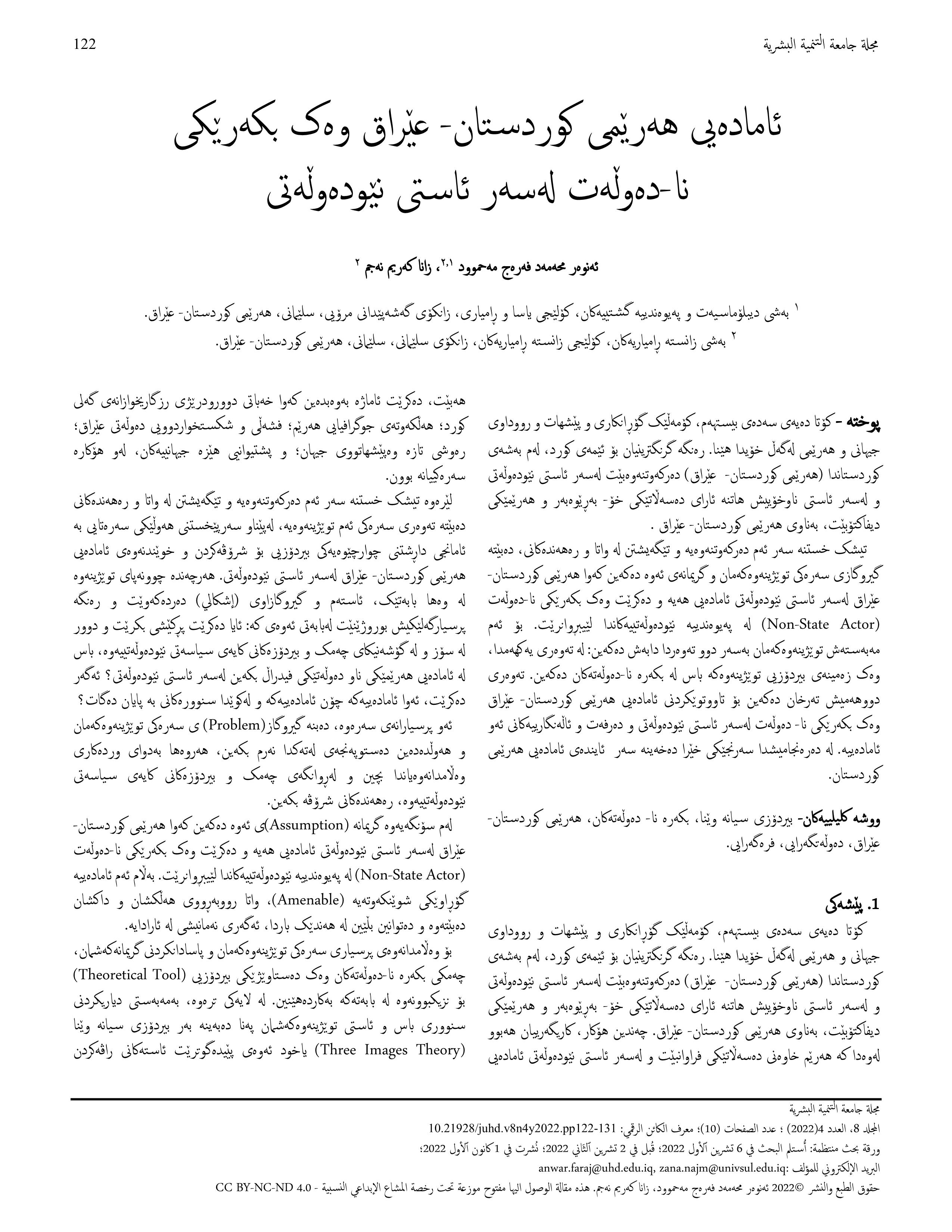The Presence of the Kurdistan Region- Iraq as a Non-state Actor at the International Level
DOI:
https://doi.org/10.21928/juhd.v8n4y2022.pp122-131Keywords:
Three Images Theory, Non-state Actor, Kurdistan Region-Iraq, Statism, PluralismAbstract
The last decade of the 20th century bring about some global and regional changes and developments. Perhaps the most important for us (in this part of Kurdistan) is the reemergence in international arena and creation of a self-governing authority and a de facto region called the Kurdistan Region - Iraq.
Highlighting this phenomenon and understanding its meaning and dimensions will be the main problem of our research and we assume that the Kurdistan Region-Iraq is present at the international level and can act as a non-state actor in international relations. Therefore, we use the concept of non-state actors as a theoretical tool to approach the subject and in order to determine the boundaries of our discussion and level of analysis; we resort to the three images theory or the so-called levels of analysis.
Regarding the time framework of our research, it starts from the last decade of the last century until the present time, and we have a look at the future of this presence. Therefore, we divide our research into two sections: In the first section, we discuss non-state actors as the theoretical basis of the research. The second section will be devoted to discussing the presence of the Kurdistan Region of Iraq as a non-state actor at the international arena and the opportunities and challenges of this presence, and consequently we will focus on the future of this presence.
References
بە زمانی کوردی
ئەنجومەنی نوێنەرانی عێراق. (2014). دەستووری کۆماری عێراق (چاپی چوارەم).
خاروداکی، ماریانا. (2011). کورد و سیاسەتی دەرەوەی وڵاتە یەکگرتووەکان: پێوەندییە
نێودەوڵەتییەکان لە رۆژهەڵاتی ناوین لە 1945 ەوە، وەرگێڕانی لە ئینگلیزییەوە مامکاک، دەزگای چاپ و بڵاوکردنەوەی ئاراس: هەولێر، هەرێمی کوردستان- عێراق.
رەفیق، فاروق. (2014). لۆژیک و هونەری ئەڕگومێنتسازی، کۆمپانیای ئاگۆرا بۆ بەرهەمە
کلتورییەکان: سلێمانی، هەرێمی کوردستان- عێراق.
نەجم، زانا کەریم. (2018، تەمووز2). روانینێک بۆ پێگەی هەرێمی کوردستان لە پەیوەندییە
نێودەوڵەتییەکاندا. رۆژنامەی رووداو، ل.14.
نەجم، زانا کەریم. (2019، ئاب26). گەڕانەوەی بەغداد. رۆژنامەی رووداو، ل.17.
نەجم، زانا کەریم. (2021). "دیپلۆماسی هەرێمی کوردستان و ئاڵنگارییە یاساییەکانی". گۆڤاری
ئایندەناسی، 7، 10-20.
پێگەی فەڕمی فەرمانگەی پەیوەندییەکانی دەرەوەی حکومەتی هەرێمی کوردستان (أ). (1/11/2022 سەردانیکراوە). لەم بەستەرەوە: gov.krd/dfr/krg-representations/
پێگەی فەڕمی فەرمانگەی پەیوەندییەکانی دەرەوەی حکومەتی هەرێمی کوردستان (ب). (1/11/2022 سەردانیکراوە). لەم بەستەرەوە: gov.krd/dfr/foreign-representations/
بە زمانی عەرەبی
أبو ليلة، سعاد محمود. (2013). "عدم التماثل: الأطر النظرية المفسرة لدور الفاعلين العابرين
للقومية". مجلة السياسة الدولية- ملحق إتجاهات نظرية، 192، 5-10.
إيفانز غ. ونوينهام ج. (2004). قاموس بنغوين للعلاقات الدولية، ترجمة مركز الخليج للأبحاث،
مركز الخليج للأبحاث: دبي، الإمارات العربية المتحدة.
برايار، فيليب وجليلي، محمد رضا. (2009). العلاقات الدولية، ترجمة حنان فوزي حمدان، دار
ومكتبة الهلال للطباعة والنشر: لبنان، بيروت.
بن سعيد، مراد. (2014). "من الحوكمة الدولية إلى الحوكمة العالمية: التحولات الأنطولوجية في
تحليل الحوكمة البيئية العالمية". مجلة المستقبل العربي، 421، 134-154.
جوف، إدمون. (1993). علاقات دولية، ترجمة: منصور القاضي، المؤسسة الجامعية للدراسات
والنشر والتوزيع: لبنان، بيروت.
حمشي، محمد وزقاغ، عادل. (2022). عن السياسة ما بعد الدولية: تعايش بين نظامين أم عصر
وسيط جديد. مجلة سياسات عربية، 10 (54)، 7-24.
خاروداكي، ماريانا. (2013). الكرد والسياسة الخارجية الأمريكية: العلاقات الدولية في الشرق
الأوسط منذ 1945، ترجمة خليل الجيوسي، دار الفارابي: بيروت، لبنان.
دن، تيموثي. (2004). الليبرالية. في ج. بيليس وس. سميث (محرران)، عولمة السياسة العالمية (ص ص312-348). الإمارات العربية المتحدة: مركز الخليج للأبحاث.
رجب، إيمان أحمد. (2012). "اللاعبون الجدد: أنماط وأدوار الفاعلين من غير الدول في المنطقة
العربية". مجلة السياسة الدولية، 187، 34-41.
رجب، إيمان أحمد. (2013). "القوة المنافسة: مداخل تحليل الفاعلين العنيفين من غير الدول في
المراحل الإنتقالية". مجلة السياسة الدولية- ملحق إتجاهات نظرية، 192، 11-16.
سميث، ستيف. (2004). مقاربات جديدة للنظرية الدولية. في ج. بيليس وس. سميث (محرران)، عولمة السياسة العالمية (ص ص349-407). الإمارات العربية المتحدة: مركز الخليج للأبحاث.
الصديقي، سعيد. (2006). القوى السياسية عبر الوطنية، في: حافظ ابراهيم وآخرون، السيادة والسلطة، مركز دراسات الوحدة العربية: لبنان، بيروت.
عزم، أحمد جميل. (2010). "عودة الدولة في السياسة الخارجية". مجلة آفاق المستقبل، 3،40-
غلان، جيرهار فان. (سنة الطبع، بلا). القانون بين الأمم، ترجمة عباس العمر، دار الجيل ودار آفاق الجديدة: بيروت، لبنان.
نجم، زانا كريم. (2021). الفاعلون من غير الدول ودورهم في السياسة العالمية: إقليم كوردستان- العراق إنموذجاً، مطبعة كارو: سليمانية، إقليم كوردستان- العراق.
محمود، أنور محمد فرج. (2017). "الفاعلون من غير الدول والدولة الفاشلة: دراسة من منظور
العصور الوسطى الجديدة في الشرق الأوسط". مجلة دراسات قانونية وسياسية، 9،264-294.
محمود، أنور محمد فرج. (2012). المجتمع المدني العالمي بين الفاعلية والشرعية.
AL-Mostansiriyah journal for arab and international studies, (37).
مقلد، د. إسماعيل صبري. (2013). السياسة الخارجية: الأصول النظرية والتطبيقات العملية،
المكتبة الأكاديمية: القاهرة، مصر.
النجار، د. شيرزاد أحمد أمين. (2014). " مركز اقليم كوردستان- العراق في السياسة العالمية:
حالة عدم اليقين؟". مجلة قضايا سياسية، 35-36، 107-138.
الهياجنة، عدنان محمد حسين. (2001). قضايا العلاقات الدولية بين الواقعية والعالمية". مجلة العلوم الإجتماعية، 2، 7-30.
المجلس الوطني لإقليم كوردستان- العراق. (1993، كانون الأول 30). البرلمان: صحيفة المجلس
الوطني لإقليم كوردستان- العراق، 17، 2.
حكومة إقليم كوردستان- العراق. (2006، آب 27). وقائع كوردستان: الجريدة الرسمية لحكومة إقليم كوردستان- العراق، 62، 43.
بەزمانی ئینگلیزی
Folker, J. S. (2010). Neoliberalism. In: Tim Dunne, Milja Kurki, Steve Smith (Eds.), International Relations Theories. UK: Oxford University Press.
Josselin D. & Wallace W. (Eds.). (2011). Non-State Actors in World Politics: a Framework. New York: Palgrave.
Morgenthau, H. J. (1993). Political Among Nations: The Struggle for Power and Peace. New York: MC Graw Hill.
Nye, Jr. J. S. (2011). The Future of Power. New York: public affairs.
Waltz, K. N. (2010). Theory of International Politics. USA:
Waveland Press, Inc.
Willetts, P. (2014). Transnational Actors and International
Organizations in Global Politics. In: J. Baylis, S. Smith, & P. Owens (Eds.), the Globalization of World Politics. UK: Oxford University Press.

Downloads
Published
How to Cite
Issue
Section
License
Copyright (c) 2022 Anwar Mohamed Faraj, Zana Karim Najm

This work is licensed under a Creative Commons Attribution-NonCommercial-NoDerivatives 4.0 International License.


